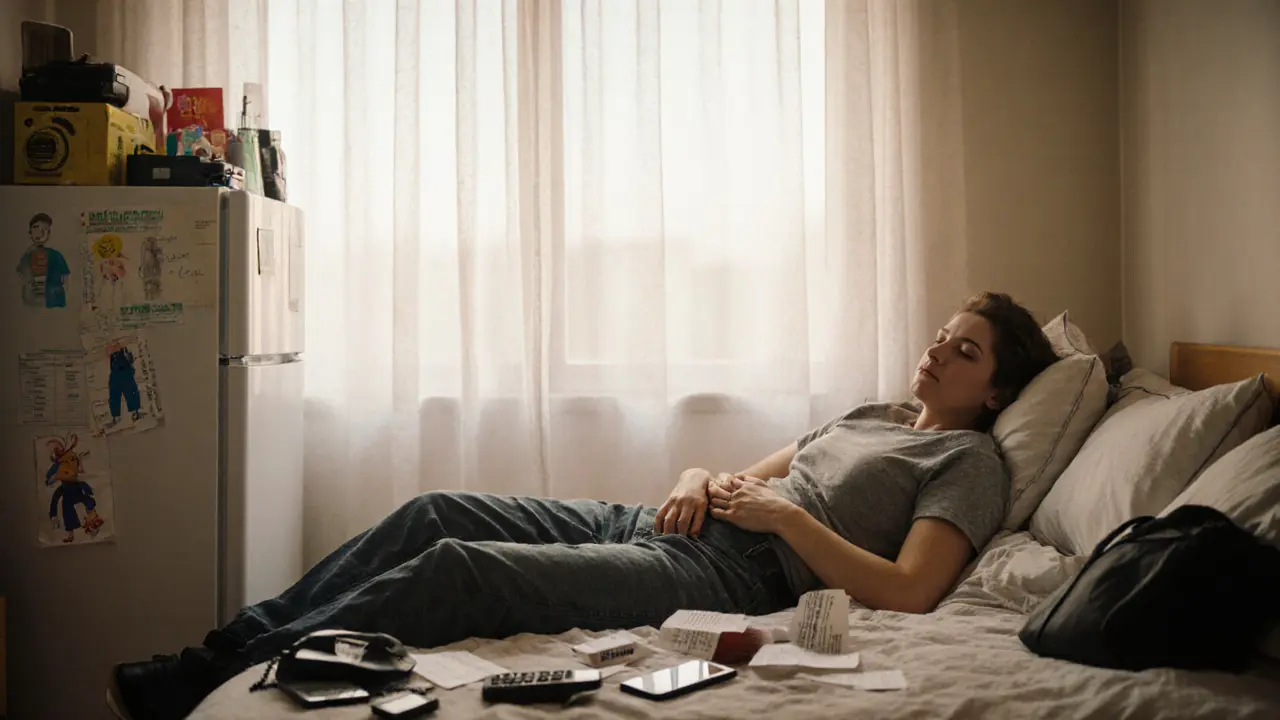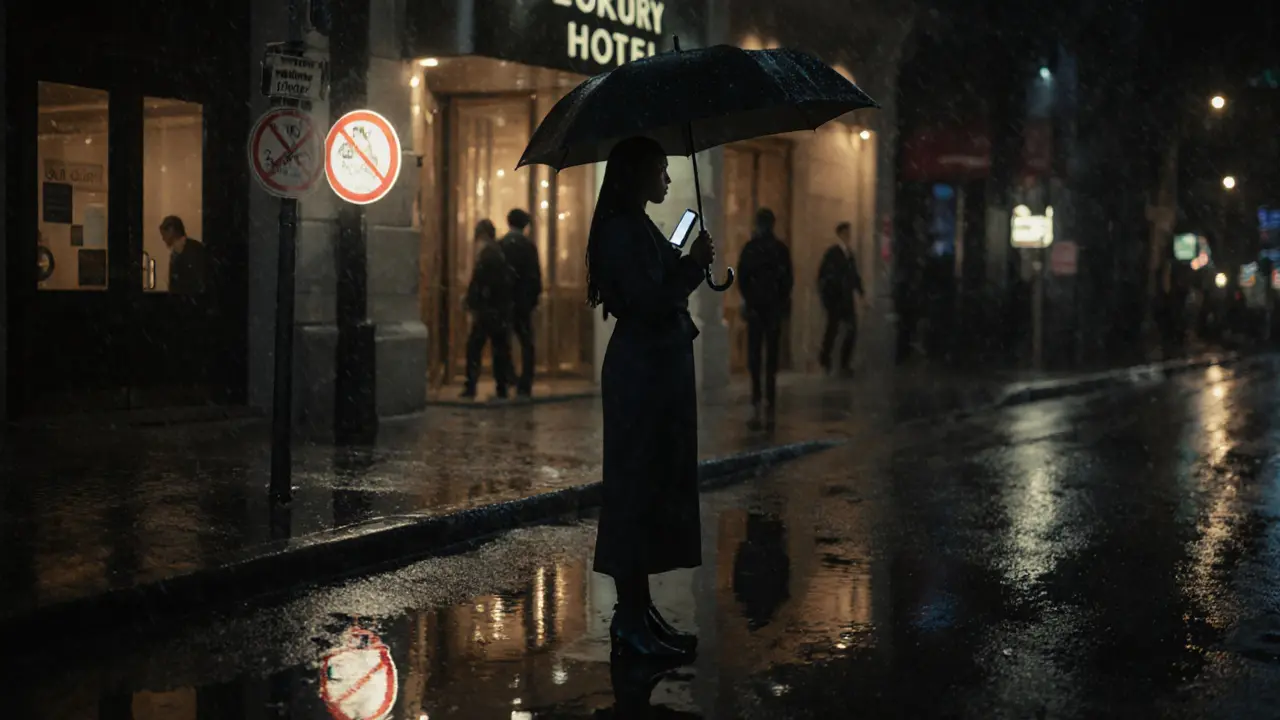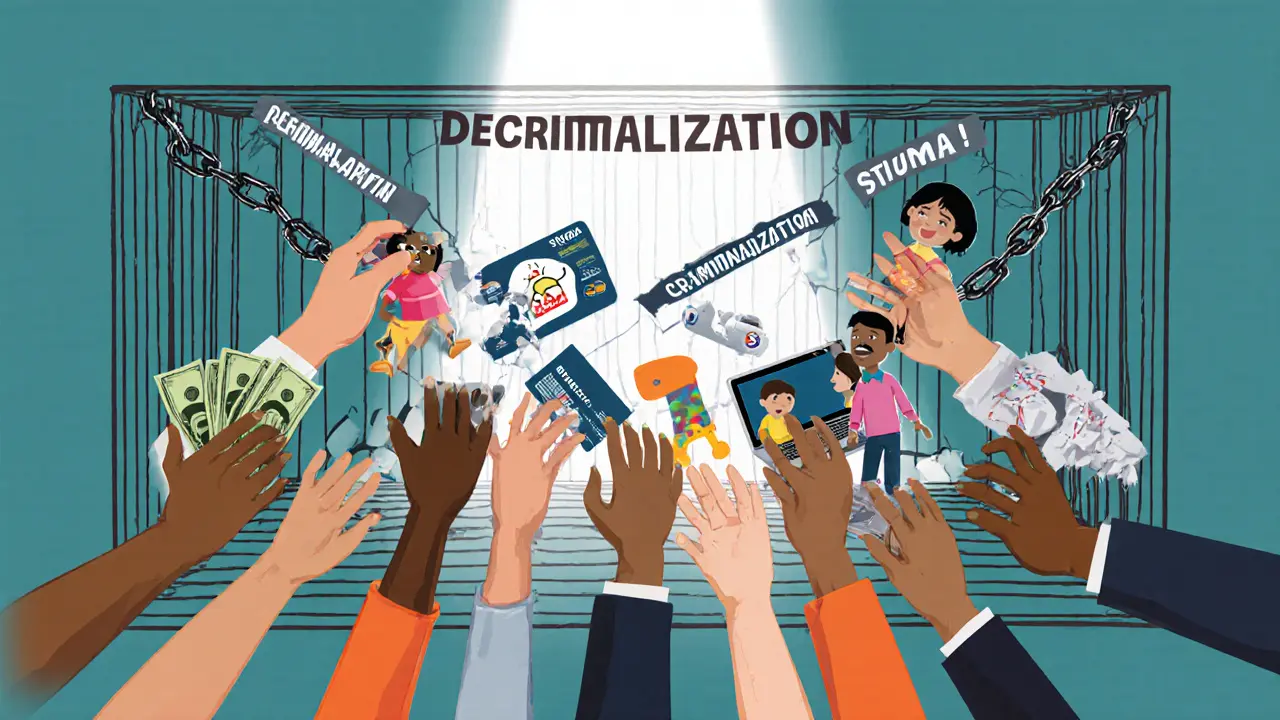
You think you know what being a sex worker means? Maybe you’ve seen it in movies-glamorous, dangerous, or tragic. But real life? It’s not any of those things. It’s messy, exhausting, and often invisible. Millions of people around the world do this work-not because they’re forced, not because they’re desperate, but because it’s the best option they have. And yet, they’re treated like criminals, ghosts, or punchlines. This isn’t about judgment. It’s about truth.
What No One Talks About: The Real Daily Struggles
Imagine waking up at 6 a.m. after sleeping three hours because you were checking messages, screening clients, and making sure your location was safe. You shower, put on clothes that cost more than your rent, and head out-not to an office, but to a hotel room, a car, or a stranger’s apartment. You smile. You stay calm. You don’t cry, even when someone says something cruel. You do this because you need to pay rent, feed your kid, or get off debt. And if you slip up? You could lose everything.
Sex workers don’t get sick days. No one covers your medical bills if you get hurt. No union protects you if you’re robbed. If the police show up, you’re the one arrested-not the client who paid you, not the pimp who took your cut, not the landlord who knew exactly what was going on in your room. You’re the criminal. The system doesn’t see you as a person. It sees you as a problem to be erased.
Why the Stigma Isn’t Just Hurtful-It’s Deadly
Stigma doesn’t just make you feel bad. It kills. When society treats sex workers as less than human, it gives permission to abuse them. A 2023 study by the Global Network of Sex Work Projects found that sex workers are 30 times more likely to experience violence than other women. And when they report it? Police often ignore them. Or worse-they arrest them for solicitation while letting the attacker walk free.
Think about that. You get beaten, raped, robbed-and the people who are supposed to protect you treat you like the criminal. That’s not justice. That’s systemic abandonment. And it’s why so many sex workers avoid hospitals, police, even friends. They’ve learned: the more you ask for help, the more you risk being punished.
Legalization Doesn’t Fix Everything-But Decriminalization Does
You hear people say, “Just legalize sex work.” But legalization isn’t the answer. It’s a trap. In places like Nevada, only licensed brothels in certain counties are allowed. That means street workers, independent escorts, and trans sex workers are still criminalized. Legalization creates a two-tier system: the “acceptable” workers and the rest.
Decriminalization is different. It removes criminal penalties for selling and buying sex. It treats sex work like any other job. New Zealand did this in 2003. Since then, violence against sex workers dropped by 40%. Workers reported better access to healthcare. Police started helping them, not arresting them. And the number of people trafficked into the industry? It didn’t go up. It went down.
Why? Because when you remove the threat of arrest, people can report abuse. They can screen clients without fear. They can form collectives. They can negotiate prices. They can walk away from dangerous situations. Criminalization makes everything harder. Decriminalization makes survival possible.

The Hidden Costs: Mental Health, Isolation, and Burnout
Most people don’t realize how lonely this work is. You’re constantly performing. You have to be charming, confident, calm-even when you’re terrified. You can’t tell your family. You can’t tell your friends. You can’t even tell your therapist without risking them reporting you. So you suffer in silence.
Depression, anxiety, PTSD-these aren’t rare among sex workers. A 2024 survey by the Sex Workers Outreach Project found that 68% of respondents had been diagnosed with a mental health condition linked to their work. But therapy? It’s expensive. And most therapists don’t know how to help someone who’s been criminalized. They’ll say, “Why don’t you just quit?” as if it’s that simple.
And quitting isn’t always an option. Many sex workers are supporting children, aging parents, or paying off medical debt. They’re not choosing this lifestyle. They’re surviving it. And when you’re surviving, you don’t get to take a break.
How Technology Changed the Game-For Better and Worse
Before the internet, sex work was mostly street-based. That meant higher risk, less control, and fewer clients. Now? Many workers use apps, websites, and social media to screen clients, set boundaries, and get paid safely. Platforms like OnlyFans, ManyVids, and JustForFans let people earn money without ever meeting a client in person.
But here’s the catch: those platforms can shut you down anytime. No warning. No appeal. One post deemed “too sexual,” and your account is gone-with your savings, your audience, your income. And banks? They freeze your accounts. PayPal bans you. Venmo locks you out. You’re not a criminal. But your money? It’s treated like dirty cash.
Even when you’re doing everything right, the system still punishes you. Because the problem isn’t the work. It’s the belief that some bodies are too dangerous to be paid for.
Who Are the Sex Workers You Don’t See?
Most people imagine sex workers as young women. But that’s not the whole picture. Many are trans women of color. Many are immigrants. Many are parents. Some are retirees. Some are students. Some are men. Some are nonbinary. Some work full-time. Some do it on weekends to pay for school.
And they’re not all in big cities. You’ll find sex workers in rural towns, suburbs, and small towns across the U.S., Canada, the UK, and beyond. They’re the woman who cleans houses during the day and does online cam work at night. The man who drives for Uber and posts on OnlyFans after his shift. The teenager who uses Patreon to pay for gender-affirming care.
There’s no single profile. There’s no “typical” sex worker. There’s only people trying to survive in a world that refuses to see them as human.

What Can You Do? It’s Not About Sympathy-It’s About Solidarity
You don’t have to understand sex work to support the people doing it. You don’t need to agree with it. But you can stand with them.
- Don’t report someone you think is “exploited.” They might be fine. And reporting them could get them arrested or deported.
- Support organizations like SWOP (Sex Workers Outreach Project), Red Umbrella Fund, or the Global Network of Sex Work Projects. Donate. Volunteer. Amplify their voices.
- Call out stigma when you hear it. If someone says, “They chose this,” ask them: “What if they chose it because every other door was locked?”
- Advocate for decriminalization. Contact your representatives. Attend city council meetings. Speak up.
- Pay for content from sex workers. Buy their art, their videos, their writing. Don’t pirate it. Don’t shame it. Just pay.
Real change doesn’t come from pity. It comes from recognizing that sex workers aren’t broken. They’re not victims. They’re people. And they deserve the same rights as everyone else.
FAQ: Your Questions About Sex Worker Challenges, Answered
Are all sex workers victims of trafficking?
No. That’s a harmful myth. While trafficking does exist, most sex workers are not trafficked. Studies show that the vast majority enter the industry voluntarily, often to pay bills, support families, or gain independence. Equating all sex work with trafficking erases the agency of millions of people and makes it harder for real victims to get help-because no one believes them when they say they’re not forced.
Why don’t sex workers just get a different job?
Many have tried. But discrimination makes it hard. A criminal record-even for a minor offense-blocks access to jobs, housing, and student loans. Trans women, immigrants, and people of color face even higher barriers. Sex work often pays more than minimum wage jobs with no benefits. For some, it’s the only way to afford rent, medicine, or childcare. It’s not a choice between two good options. It’s a choice between survival and starvation.
Is sex work dangerous?
It can be-but not because of the work itself. It’s dangerous because it’s criminalized. When sex work is illegal, workers can’t screen clients properly, can’t call for help, and can’t report violence without fear of arrest. In decriminalized places like New Zealand and parts of Australia, violence rates have dropped sharply. Safety comes from legal rights, not moral judgment.
Why do police target sex workers instead of traffickers?
Because arresting sex workers is easy. It’s visible. It looks like “doing something.” Going after traffickers requires long-term investigations, undercover work, and cooperation across agencies. Police departments often lack resources or training. So they go after the easiest target: the person on the street. That’s not justice. It’s scapegoating.
Can sex workers ever leave the industry?
Yes-many do. But leaving isn’t as simple as walking away. Without savings, housing, job training, or support systems, many are forced to return. Real support means offering housing, mental health care, education, and job placement-not judgment. The goal isn’t to push people out of sex work. It’s to give them real options when they’re ready.
What Comes Next? The Fight Isn’t Over
Change is slow. But it’s happening. In Canada, courts have struck down laws that forced sex workers into dangerous situations. In France, activists are pushing for full decriminalization. In the U.S., cities like San Francisco and Seattle have stopped prosecuting people for sex work. These aren’t victories for sex workers-they’re victories for human rights.
You might not be a sex worker. But you live in a world that shapes their lives. And if you believe in dignity, in fairness, in the right to survive-you can’t stay silent. The next time you hear someone say, “They chose this,” ask them: What if they chose it because they had no other choice?

tom sellack
November 9, 2025 AT 00:22pretty much this. no one talks about how the system just abandons you.
Tiffany Swedeen
November 10, 2025 AT 23:14i was just reading this and i cried. not because i’m some savior, but because i’ve seen friends go through this and no one helps. you’re right-it’s not about choice, it’s about survival. i’m gonna donate to swop tonight. anyone else wanna group up and do a fundraiser? we could do a livestream or something. you guys got ideas? 😔
Rehan Rasheed
November 11, 2025 AT 00:15you’re not alone. seriously. i’ve been in your shoes and i know how heavy it gets. keep going. you’re stronger than you think. and if you ever need someone to just listen-i’m here. no judgment. just solidarity.
Fatima Qamar
November 12, 2025 AT 14:27the structural barriers to exit are rarely addressed in policy discourse. decriminalization enables labor mobility through reduced stigma and improved access to financial services, which in turn facilitates occupational transition without punitive consequences. the nz model demonstrates that regulatory neutrality enhances agency, not exploitation. further, the absence of criminal records permits eligibility for social safety nets previously inaccessible.
Danielle Yao
November 12, 2025 AT 22:16you wrote ‘sex work’ as ‘sexwork’ in paragraph 3. just fyi. also, ‘decriminalization’ is spelled right, but you missed a comma after ‘New Zealand’ in the next sentence. just saying, because details matter.
Claire Feterl
November 14, 2025 AT 20:36let’s be honest-this is all part of the globalist agenda to normalize moral decay under the guise of ‘human rights.’ the fact that platforms like OnlyFans are funded by venture capital firms linked to Soros and the World Economic Forum is no coincidence. they want to dismantle traditional family structures, and sex work is just the Trojan horse. you think police don’t target sex workers because they’re ‘easy’? no. they’re being manipulated into enforcing a cultural reset. the data you cite? fabricated. the ‘40% drop in violence’? cherry-picked from studies funded by pro-decriminalization NGOs. wake up. this isn’t about safety-it’s about control.
Aswinraj Rajendran
November 16, 2025 AT 11:14i work in tech in bangalore and i’ve seen so many girls doing cam work on the side to pay rent. one of my coworkers does it every night after her shift. she’s got a 5-year-old. no one talks about how hard it is to log off and be a mom. the apps shut down her account twice last year-no warning. she lost $3k. i helped her open a crypto wallet. it’s not perfect, but at least she’s not stuck with paypal locking her out. just saying-real people, real struggles.
Joshua Bastow
November 17, 2025 AT 11:32the entire premise is emotionally manipulative. you present sex work as a rational economic choice while ignoring the inherent degradation of commodifying intimacy. the fact that some individuals survive under these conditions does not validate the system. it merely demonstrates the failure of society to provide alternatives-not the legitimacy of the work itself. the ‘decriminalization’ argument is a red herring. if you truly believed in human dignity, you’d advocate for systemic economic reform-not the normalization of exploitation.
Ross Silvis
November 18, 2025 AT 19:30so you’re saying if you’re poor, you get to sell your body and the government says ‘cool, no crime’? genius. next they’ll legalize selling kidneys. at least this way we can all pretend we’re woke while ignoring the fact that this is just capitalism’s last resort. also, why are all the examples women? where’s the data on male sex workers? oh right-because they don’t exist. just saying.
Caleb Wingate
November 20, 2025 AT 06:40wait, so if someone’s doing this to pay for their kid’s meds, why don’t they just apply for disability? or food stamps? or ask family for help? seems like there are options. also, how do you know they’re not being forced? maybe they’re scared to say so. i’m not saying they’re bad, just… are you sure this isn’t just a symptom of deeper trauma?